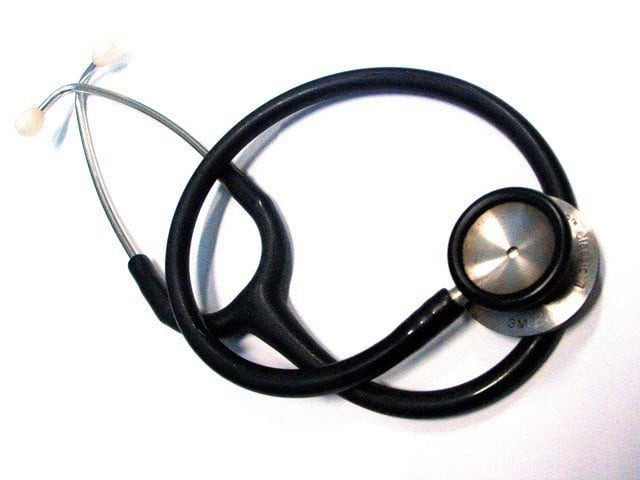Allocations for health sector development projects cut by Rs3b
Health remains third largest sector in terms of resource allocation

PHOTO: FILE
However, Chief Minister Murad Ali Shah said that no new schemes have been included in the health sector for the next financial year. According to him, the new health schemes will be initiated under the provision of Rs50 billion earmarked separately as block allocation in the Annual Development Programme (ADP) 2018-19.
Next year's ADP for health, excluding new schemes, is pitched at Rs12.5 billion, including Rs6.6 billion for various hospitals in the province, Rs1.4 billion for teaching hospitals and Rs3 billion for preventive programmes. An amount of Rs2.3 billion has been allocated for foreign-funded projects by the health department.
"The main focus of the outgoing government has been timely completion of ongoing schemes for their prompt utilisation, strengthening and improvement of existing infrastructure," said Shah.
Sindh budget to be announced today
Health remains the third largest sector in terms of resource allocation. The current revenue expenditure of the health department, excluding medical education, has been increased significantly by 13.6% from Rs84.8 billion in the current fiscal year to Rs96.38 billion in the upcoming year.
However, the allocation for the health sector in the non-development sector for the first three months of the financial year 2018-19 is Rs12.2 billion, while it was Rs85.3 billion for the current year.
The grant for the National Institute of Cardiovascular Diseases (NICVD) has been increased from Rs5.77 billion to Rs.8.09 billion for the establishment of satellite centres in Tando Muhammad Khan, Larkana, Hyderabad, Sehwan, Nawabshah and Mithi in collaboration with the government of Sindh.
The centre in Khairpur will be made functional soon, said Shah, adding that the modern and well-equipped cardiac facilities will provide services free of charge, along with 24/7 cardiac emergency care.
According to him, the NICVD is the biggest centre for the treatment of heart-related ailments and is providing timely and accessible cardiac services with six chest pain units in Karachi.
Sindh lags behind in health expenditure
The Sindh government is providing Rs.5.59 billion to the Sindh Institute of Urology and Transplantation (SIUT) as a grant in the next financial year to sustain its services in Karachi and for its new initiatives in other cities. This includes the establishment of the SIUT in Larkana with an allocation of Rs497.5 million.
The SIUT has already established its Sukkur chapter with an investment of Rs552.27 million and a bone marrow transplantation unit in its existing premises at a cost of Rs692.78 million, which is equipped with state-of-the-art infrastructure and facilities, benefiting 50 to 100 patients.
With an aim to reduce stunting in children by 30% in the next five years, the government has raised the budgetary allocation from Rs2.4 billion to Rs5.1 billion for the upcoming year.
The Sindh Immunisation Support Programme will continue with Rs1.8 billion. The grant in the aid budget of the Indus Hospital, Karachi, is kept at Rs1 billion, while the allocation for the Kidney Centre has been increased from Rs40 million to Rs100 million. The allocation for the Thar Foundation is Rs500 million, Rs200 million for the Cancer Foundation and Rs80 million for the Fatimid Foundation. Meanwhile, as many as 2,160 lady health workers will be appointed in Thar.
Sindh's transport projects are on the road to nowhere
The budget for the Child Life Foundation has been increased from Rs400 million to Rs777 million. The Layton Rahmatulla Benevolent Trust has been allocated Rs70 million and Rs365 million has been allocated for the Sindh Health Care Commission.
The allocation for purchase of drugs and medicines has been increased by 20% from Rs7.9 billion to Rs9.5 billion. Apart from this, Rs220 million and Rs250 million have been allocated for the chemical and biological sciences and DNA laboratory and construction of a new outpatient department building at Lady Dufferin Hospital.
The Sindh government increased the special incentive allowance for vaccinators to Rs4,000 and the stipend for nurse students and nursing cadre from Rs6,860 to Rs15,880. Specialists, medical doctors and paramedic staff, especially in Tharparkar district, will get a hard area allowance of between Rs10,000 and Rs140,000 for employees from grade 1 to grade 20 and above. The employees of devolved institutions, the Jinnah Postgraduate Medical Centre and National Institute of Child Health, will get health professional allowances at half the basic pay per month.



















COMMENTS
Comments are moderated and generally will be posted if they are on-topic and not abusive.
For more information, please see our Comments FAQ